2023届高三英语复习评论性状语 关系词和-ever用法课件(28张PPT)
文档属性
| 名称 | 2023届高三英语复习评论性状语 关系词和-ever用法课件(28张PPT) |  | |
| 格式 | pptx | ||
| 文件大小 | 341.1KB | ||
| 资源类型 | 教案 | ||
| 版本资源 | 通用版 | ||
| 科目 | 英语 | ||
| 更新时间 | 2022-10-31 07:43:41 | ||
图片预览

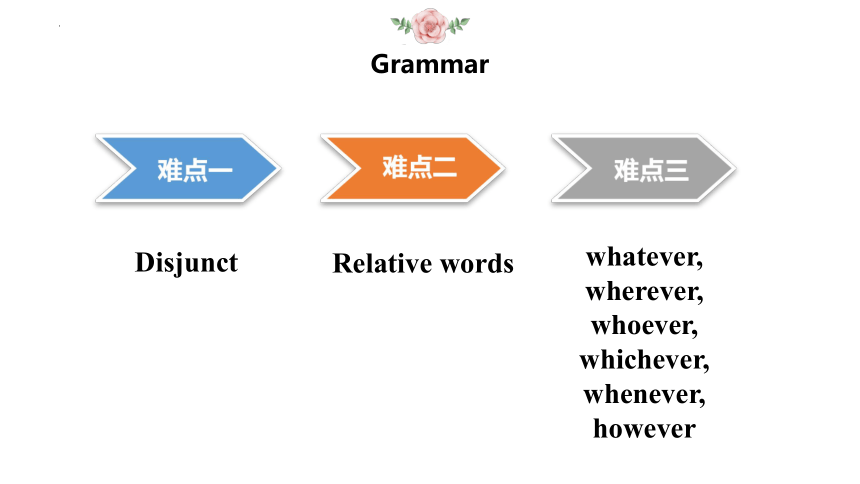
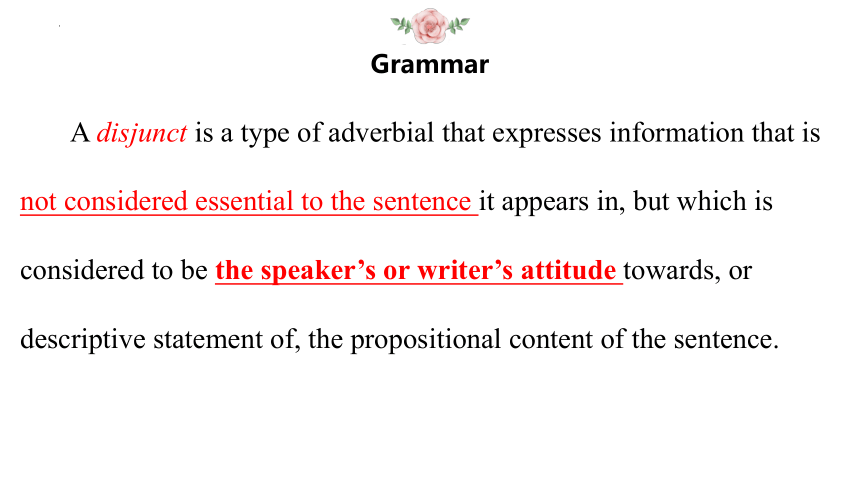
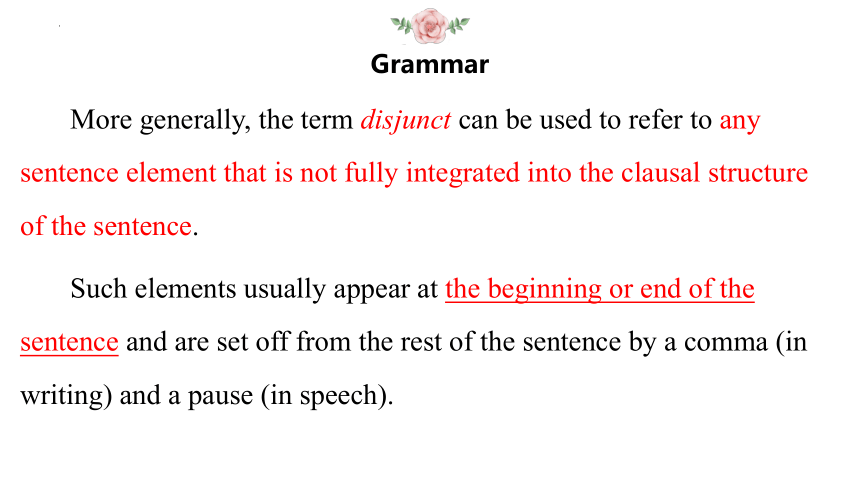
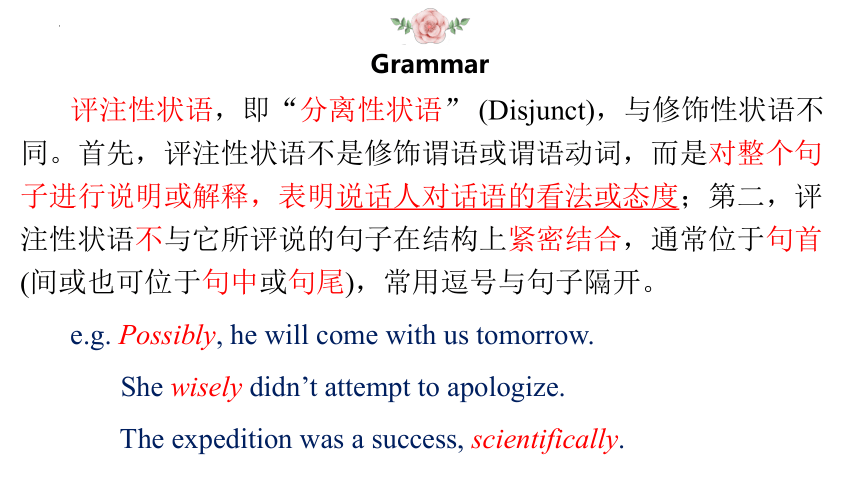
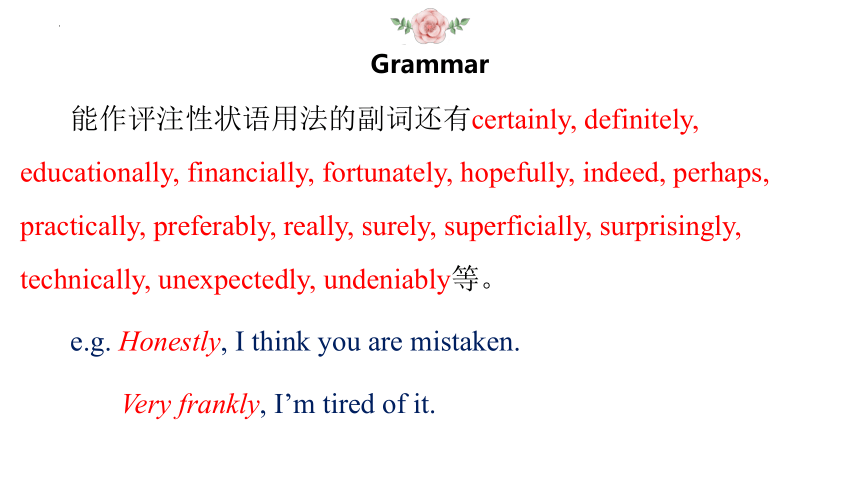
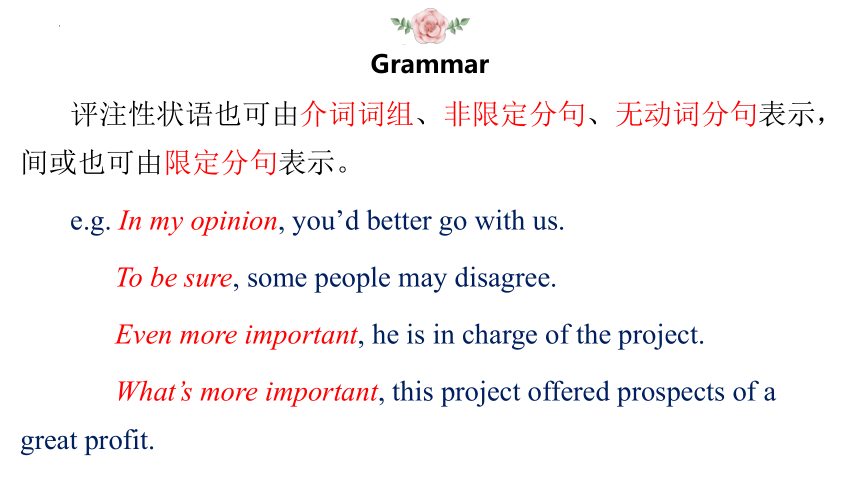
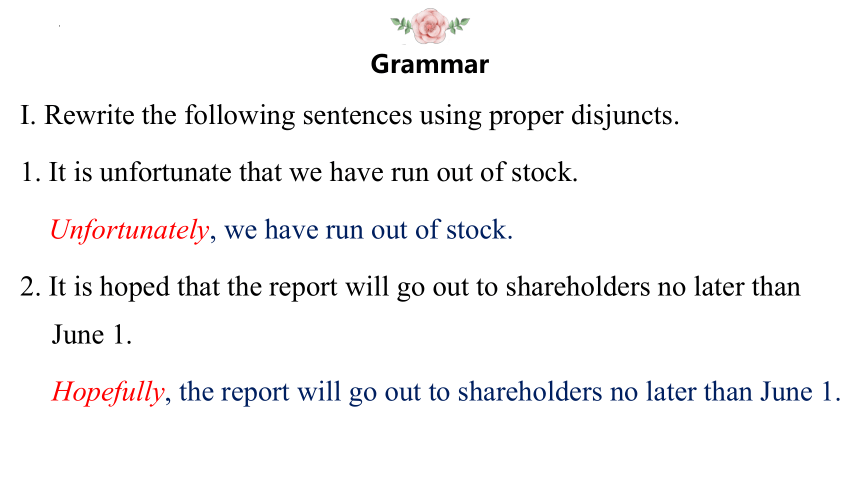
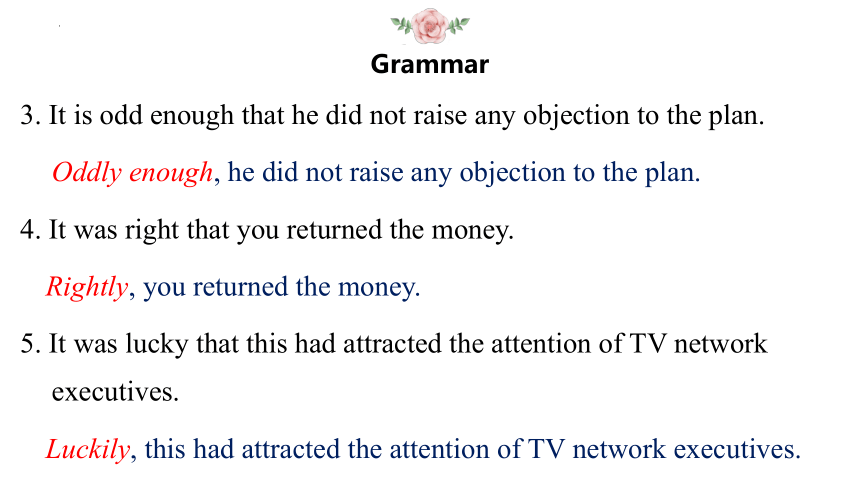
文档简介
(共28张PPT)
01
Grammar
Grammar
难点二
难点一
难点三
Disjunct
Relative words
whatever,
wherever,
whoever,
whichever,
whenever,
however
Grammar
A disjunct is a type of adverbial that expresses information that is not considered essential to the sentence it appears in, but which is considered to be the speaker’s or writer’s attitude towards, or descriptive statement of, the propositional content of the sentence.
Grammar
More generally, the term disjunct can be used to refer to any sentence element that is not fully integrated into the clausal structure of the sentence.
Such elements usually appear at the beginning or end of the sentence and are set off from the rest of the sentence by a comma (in writing) and a pause (in speech).
Grammar
评注性状语,即“分离性状语” (Disjunct),与修饰性状语不同。首先,评注性状语不是修饰谓语或谓语动词,而是对整个句子进行说明或解释,表明说话人对话语的看法或态度;第二,评注性状语不与它所评说的句子在结构上紧密结合,通常位于句首 (间或也可位于句中或句尾),常用逗号与句子隔开。
e.g. Possibly, he will come with us tomorrow.
She wisely didn’t attempt to apologize.
The expedition was a success, scientifically.
Grammar
能作评注性状语用法的副词还有certainly, definitely, educationally, financially, fortunately, hopefully, indeed, perhaps, practically, preferably, really, surely, superficially, surprisingly, technically, unexpectedly, undeniably等。
e.g. Honestly, I think you are mistaken.
Very frankly, I’m tired of it.
Grammar
评注性状语也可由介词词组、非限定分句、无动词分句表示,间或也可由限定分句表示。
e.g. In my opinion, you’d better go with us.
To be sure, some people may disagree.
Even more important, he is in charge of the project.
What’s more important, this project offered prospects of a great profit.
Grammar
I. Rewrite the following sentences using proper disjuncts.
1. It is unfortunate that we have run out of stock.
Unfortunately, we have run out of stock.
2. It is hoped that the report will go out to shareholders no later than June 1.
Hopefully, the report will go out to shareholders no later than June 1.
Grammar
3. It is odd enough that he did not raise any objection to the plan.
Oddly enough, he did not raise any objection to the plan.
4. It was right that you returned the money.
Rightly, you returned the money.
5. It was lucky that this had attracted the attention of TV network executives.
Luckily, this had attracted the attention of TV network executives.
Grammar
6. It was fortunate that all went well.
Fortunately, all went well.
7. It is strange enough that the burglar should not have taken the diamond away.
Strangely enough, the burglar didn’t take the diamond away.
Note: 在‘It is + adj./ n. + that...’结构中,表示说话人‘惊异、懊悔、失望’等情感的形容词或名词后的从句中, 谓语动词用should do或should have done, should不可省略, 表示‘竟然、居然...’
Grammar
II. Rewrite the following according to the models.
Disjuncts can be subdivided into two types:
1) those whose judgment carries no implication to the subject of the clause, such as remarkably, amazingly, astonishingly, curiously, naturally, fortunately, happily, thankfully and sadly.
This type of disjunct correspond to the clause It be...that...
e.g. Oddly enough, the men whom he flunked did not resent it.
It was odd enough that the men whom he flunked did not resent it.
Grammar
2) those that express a judgment on what is being said as a whole and that normally apply the same judgment simultaneously to the subject of the clause, for example, rightly, correctly, justly, foolishly, wisely, cleverly, prudently, rightly and wrongly;
This type of disjunct correspond to the clauses It be...that..., It be...of... or to an infinitive clause.
Grammar
e.g. Foolishly, Bill declined the invitation.
It was foolish that Bill declined the invitation.
1) It is + adj. + that...
It was foolish of Bill to decline the invitation.
2) It is + adj. + of sb. to do sth.
Bill was foolish to decline the invitation.
3) sb. is + adj. + to do sth.
Grammar
1. Rightly, they protested against it.
It was right that they protested against it.
They were right to have protested against it.
2. Foolishly, the boy didn’t say a single word.
It was foolish that the boy didn’t say a single word.
It was foolish of the boy not to say a single word.
The boy was foolish not to say a single word.
Grammar
3. Wisely, John sent the man away.
It was wise that John sent the man away.
It was wise of John to have sent the man away.
John was wise to have sent the man away.
4. Sadly, the storm destroyed the entire tobacco crop.
It was sad that the storm destroyed the entire tobacco crop.
Grammar
5. Remarkably, Mrs. Jesen consulted her lawyer.
It was remarkable that Mrs. Jesen consulted her lawyer.
6. Regrettably, James refuses to speak.
It is regrettable that James refuses to speak.
Grammar
7. Thankfully, my assistant has arranged for the matter to be considered by an ad hoc working party.
ad hoc:
made or happening only for a particular purpose or need, not planned before it happens
party:
a group of people who are involved in an activity together, especially a visit
特别的;专门的;临时安排的
Grammar
7. Thankfully, my assistant has arranged for the matter to be considered by an ad hoc working party.
It is lucky that my assistant has arranged for the matter to be considered by an ad hoc working party.
8. Hopefully, a proposal will be ready in time for our next meeting.
It is hoped that a proposal will be ready in time for our next meeting.
Grammar
III. Fill in each blank with a proper relative word. Use “preposition + relative word” if necessary.
1. Good writing is built on a solid framework of logic, argument, narrative, or motivation runs through the entire piece of writing and holds it together. This is the time many writers find it most effective to outline as a way of visualizing the hidden spine the piece of writing is supported.
which
when
by which
Grammar
2. The element writers may spend a majority of their time is development.
Writers may spend a majority of their time on the element.
3. Mr. Ford still talks like the man he was ten years ago.
He was the man ten years ago.
Note: 当关系代词在从句中做表语,只能用that,也可省去,不能用which
on which
that
Grammar
4. James Russell is a man I have the greatest respect.
I have the greatest respect for the man.
5. He had many friends he had a regular correspondence.
He had a regular correspondence with many friends.
6. The woman he is engaged comes from Poland.
He is engaged to the woman.
for whom
with whom
to whom
Grammar
7. The school she is head is closing down.
She is head of the school.
8. The rate a material heats up depends on its chemical composition.
A material heats up at the rate.
of which
at which
Grammar
IV. Put in where, when, why, which or what.
1. Barnstaple, I spent my Easter holiday, has a very old covered market I bought some lovely old plates.
I spent my Easter holiday at Barnstaple.
I bought some lovely old plates at the market.
2. I could not understand the speaker said, irritated me.
Note: what = 中心词 + that
where
what
where
which
Grammar
3. He could not remember had happened before he lost consciousness.
4. I really cannot understand everybody is so excited over the news.
5. Chain stores all goods are displayed on open counters encourage hop-lifting.
All goods are displayed on open counters at chain stores.
6. we went to France last year, I was astonished to find that I could still make myself understood.
what
where
why
When
Grammar
7. I don’t know you agreed to pay the account if you feel you were cheated.
8. I forgot to post that letter yesterday, means it won’t get there till after the weekend, is annoying because I had promised to let Mrs. Jacobs know I would do to help her in the church bazaar.
why
which
which
what
Grammar
V. Complete the following sentences with the appropriate words in the box.
1. The castle we visited last weekend is very beautiful. , I would not like to live there.
2. problems you may have, we will help.
However
Whatever
whoever wherever whatever
however whenever whichever
Grammar
3. She has no friends .
whatever = whatsoever
used after a negative phrase to add emphasis to the idea that is being expressed
e.g. He has no respect for authority whatsoever.
There is no evidence whatever to show that this is in fact the case.
whatever
(用于否定句后表强调)无论怎样,丝毫,任何
Grammar
4. you go, I will follow you.
5. Take book you like best.
6. He offered a reward to should restore the lost ring.
7. late it is, you must come to the party because it will be something fantastic.
8. I may go I please. You may come you please.
Wherever
whichever
whoever
However
whenever
whenever
01
Grammar
Grammar
难点二
难点一
难点三
Disjunct
Relative words
whatever,
wherever,
whoever,
whichever,
whenever,
however
Grammar
A disjunct is a type of adverbial that expresses information that is not considered essential to the sentence it appears in, but which is considered to be the speaker’s or writer’s attitude towards, or descriptive statement of, the propositional content of the sentence.
Grammar
More generally, the term disjunct can be used to refer to any sentence element that is not fully integrated into the clausal structure of the sentence.
Such elements usually appear at the beginning or end of the sentence and are set off from the rest of the sentence by a comma (in writing) and a pause (in speech).
Grammar
评注性状语,即“分离性状语” (Disjunct),与修饰性状语不同。首先,评注性状语不是修饰谓语或谓语动词,而是对整个句子进行说明或解释,表明说话人对话语的看法或态度;第二,评注性状语不与它所评说的句子在结构上紧密结合,通常位于句首 (间或也可位于句中或句尾),常用逗号与句子隔开。
e.g. Possibly, he will come with us tomorrow.
She wisely didn’t attempt to apologize.
The expedition was a success, scientifically.
Grammar
能作评注性状语用法的副词还有certainly, definitely, educationally, financially, fortunately, hopefully, indeed, perhaps, practically, preferably, really, surely, superficially, surprisingly, technically, unexpectedly, undeniably等。
e.g. Honestly, I think you are mistaken.
Very frankly, I’m tired of it.
Grammar
评注性状语也可由介词词组、非限定分句、无动词分句表示,间或也可由限定分句表示。
e.g. In my opinion, you’d better go with us.
To be sure, some people may disagree.
Even more important, he is in charge of the project.
What’s more important, this project offered prospects of a great profit.
Grammar
I. Rewrite the following sentences using proper disjuncts.
1. It is unfortunate that we have run out of stock.
Unfortunately, we have run out of stock.
2. It is hoped that the report will go out to shareholders no later than June 1.
Hopefully, the report will go out to shareholders no later than June 1.
Grammar
3. It is odd enough that he did not raise any objection to the plan.
Oddly enough, he did not raise any objection to the plan.
4. It was right that you returned the money.
Rightly, you returned the money.
5. It was lucky that this had attracted the attention of TV network executives.
Luckily, this had attracted the attention of TV network executives.
Grammar
6. It was fortunate that all went well.
Fortunately, all went well.
7. It is strange enough that the burglar should not have taken the diamond away.
Strangely enough, the burglar didn’t take the diamond away.
Note: 在‘It is + adj./ n. + that...’结构中,表示说话人‘惊异、懊悔、失望’等情感的形容词或名词后的从句中, 谓语动词用should do或should have done, should不可省略, 表示‘竟然、居然...’
Grammar
II. Rewrite the following according to the models.
Disjuncts can be subdivided into two types:
1) those whose judgment carries no implication to the subject of the clause, such as remarkably, amazingly, astonishingly, curiously, naturally, fortunately, happily, thankfully and sadly.
This type of disjunct correspond to the clause It be...that...
e.g. Oddly enough, the men whom he flunked did not resent it.
It was odd enough that the men whom he flunked did not resent it.
Grammar
2) those that express a judgment on what is being said as a whole and that normally apply the same judgment simultaneously to the subject of the clause, for example, rightly, correctly, justly, foolishly, wisely, cleverly, prudently, rightly and wrongly;
This type of disjunct correspond to the clauses It be...that..., It be...of... or to an infinitive clause.
Grammar
e.g. Foolishly, Bill declined the invitation.
It was foolish that Bill declined the invitation.
1) It is + adj. + that...
It was foolish of Bill to decline the invitation.
2) It is + adj. + of sb. to do sth.
Bill was foolish to decline the invitation.
3) sb. is + adj. + to do sth.
Grammar
1. Rightly, they protested against it.
It was right that they protested against it.
They were right to have protested against it.
2. Foolishly, the boy didn’t say a single word.
It was foolish that the boy didn’t say a single word.
It was foolish of the boy not to say a single word.
The boy was foolish not to say a single word.
Grammar
3. Wisely, John sent the man away.
It was wise that John sent the man away.
It was wise of John to have sent the man away.
John was wise to have sent the man away.
4. Sadly, the storm destroyed the entire tobacco crop.
It was sad that the storm destroyed the entire tobacco crop.
Grammar
5. Remarkably, Mrs. Jesen consulted her lawyer.
It was remarkable that Mrs. Jesen consulted her lawyer.
6. Regrettably, James refuses to speak.
It is regrettable that James refuses to speak.
Grammar
7. Thankfully, my assistant has arranged for the matter to be considered by an ad hoc working party.
ad hoc:
made or happening only for a particular purpose or need, not planned before it happens
party:
a group of people who are involved in an activity together, especially a visit
特别的;专门的;临时安排的
Grammar
7. Thankfully, my assistant has arranged for the matter to be considered by an ad hoc working party.
It is lucky that my assistant has arranged for the matter to be considered by an ad hoc working party.
8. Hopefully, a proposal will be ready in time for our next meeting.
It is hoped that a proposal will be ready in time for our next meeting.
Grammar
III. Fill in each blank with a proper relative word. Use “preposition + relative word” if necessary.
1. Good writing is built on a solid framework of logic, argument, narrative, or motivation runs through the entire piece of writing and holds it together. This is the time many writers find it most effective to outline as a way of visualizing the hidden spine the piece of writing is supported.
which
when
by which
Grammar
2. The element writers may spend a majority of their time is development.
Writers may spend a majority of their time on the element.
3. Mr. Ford still talks like the man he was ten years ago.
He was the man ten years ago.
Note: 当关系代词在从句中做表语,只能用that,也可省去,不能用which
on which
that
Grammar
4. James Russell is a man I have the greatest respect.
I have the greatest respect for the man.
5. He had many friends he had a regular correspondence.
He had a regular correspondence with many friends.
6. The woman he is engaged comes from Poland.
He is engaged to the woman.
for whom
with whom
to whom
Grammar
7. The school she is head is closing down.
She is head of the school.
8. The rate a material heats up depends on its chemical composition.
A material heats up at the rate.
of which
at which
Grammar
IV. Put in where, when, why, which or what.
1. Barnstaple, I spent my Easter holiday, has a very old covered market I bought some lovely old plates.
I spent my Easter holiday at Barnstaple.
I bought some lovely old plates at the market.
2. I could not understand the speaker said, irritated me.
Note: what = 中心词 + that
where
what
where
which
Grammar
3. He could not remember had happened before he lost consciousness.
4. I really cannot understand everybody is so excited over the news.
5. Chain stores all goods are displayed on open counters encourage hop-lifting.
All goods are displayed on open counters at chain stores.
6. we went to France last year, I was astonished to find that I could still make myself understood.
what
where
why
When
Grammar
7. I don’t know you agreed to pay the account if you feel you were cheated.
8. I forgot to post that letter yesterday, means it won’t get there till after the weekend, is annoying because I had promised to let Mrs. Jacobs know I would do to help her in the church bazaar.
why
which
which
what
Grammar
V. Complete the following sentences with the appropriate words in the box.
1. The castle we visited last weekend is very beautiful. , I would not like to live there.
2. problems you may have, we will help.
However
Whatever
whoever wherever whatever
however whenever whichever
Grammar
3. She has no friends .
whatever = whatsoever
used after a negative phrase to add emphasis to the idea that is being expressed
e.g. He has no respect for authority whatsoever.
There is no evidence whatever to show that this is in fact the case.
whatever
(用于否定句后表强调)无论怎样,丝毫,任何
Grammar
4. you go, I will follow you.
5. Take book you like best.
6. He offered a reward to should restore the lost ring.
7. late it is, you must come to the party because it will be something fantastic.
8. I may go I please. You may come you please.
Wherever
whichever
whoever
However
whenever
whenever
